
Thomas Wilbur Cridler (1850-1914) was United States Third Assistant Secretary of State from 1897 to 1901.

Thomas Wilbur Cridler (1850-1914) was United States Third Assistant Secretary of State from 1897 to 1901.
Thomas Wilbut Cridler was born in Harpers Ferry, Virginia on November 13, 1850. He was educated in Virginia, and Washington, D.C., where he studied law.
On July 1, 1875, Cridler joined the United States Department of State as a clerk. He rose steadily through the ranks of the State Department. He traveled to Europe several times on government business and served as the State Department's special disbursing officer at the International Monetary Conference held in Brussels on November 22, 1892.
In 1897, President of the United States William McKinley named Cridler Third Assistant Secretary of State, with Cridler subsequently holding this office from April 8, 1897 until November 15, 1901. In that capacity, he was present in Paris for the signing of the Treaty of Paris (1898). He was the U.S. Special Commissioner to the 1900 Paris Exhibition and wrote a special report to the United States Congress about the Exposition. During this visit, the Government of France made Cridler an officer of the Legion of Honour.
Upon his resignation from the State Department in 1901, Cridler became Commissioner for Europe for the Louisiana Purchase Exposition. In 1911, he became vice president of the Collin Armstrong Advertising Company.
Cridler died at his home in New York City on February 23, 1914.

William McKinley was an American politician who served as the 25th president of the United States from 1897 until his assassination in 1901. A member of the Republican Party, he led a realignment that made Republicans largely dominant in the industrial states and nationwide for decades. He presided over victory in the Spanish–American War of 1898; gained control of Hawaii, Puerto Rico, the Philippines and Cuba; restored prosperity after a deep depression; rejected the inflationary monetary policy of free silver, keeping the nation on the gold standard; and raised protective tariffs.

The Pan-American Exposition was a World's Fair held in Buffalo, New York, United States, from May 1 through November 2, 1901. The fair occupied 350 acres (0.55 sq mi) of land on the western edge of what is now Delaware Park, extending from Delaware Avenue to Elmwood Avenue and northward to Great Arrow Avenue. It is remembered today primarily for being the location of the assassination of United States President William McKinley at the Temple of Music on September 6, 1901. The exposition was illuminated at night. Thomas A. Edison, Inc. filmed it during the day and a pan of it at night.

Charles Herbert Allen was an American politician and businessman. After serving in state and federal elected positions, he was appointed as the first United States-appointed civilian governor of Puerto Rico when the U.S. acquired it after the Spanish–American War. He previously had served as Assistant Secretary of the Navy under President William McKinley.

George Bruce Cortelyou was an American cabinet secretary of the early twentieth century. He served in various capacities in the presidential administrations of Grover Cleveland, William McKinley, and Theodore Roosevelt.

Lyman Judson Gage was an American financier and presidential Cabinet officer.

George de Rue Meiklejohn was an American politician who served as the fifth lieutenant governor of Nebraska under Governor John Milton Thayer and as a member of the United States House of Representatives for Nebraska. He was the United States Assistant Secretary of War from 1897 to 1901.
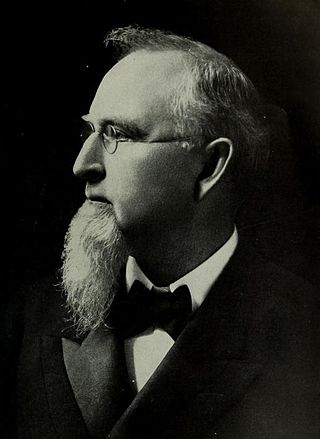
Thomas Henry Carter was an American politician, who served as territorial delegate, a United States representative, and a U.S. Senator from Montana. Carter was born in Junior Furnace, Ohio, on October 30, 1854. Born to an Irish immigrant family, he spent most of his childhood in on small farms in the Midwest. In 1882, he moved to Helena, Montana to begin his law career there. He entered then politics, and was elected Montana's territorial delegate in 1888. Following Montana's admission into the union as a state, Carter represented the state in U.S. House of Representatives. He ran for re-election in 1890, but was narrowly defeated by Democrat William W. Dixon in the general election.
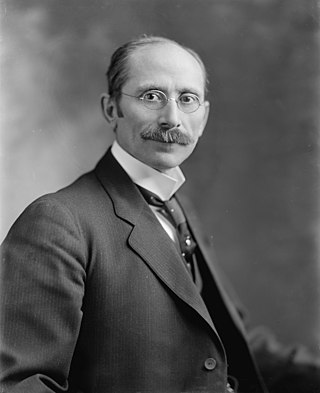
Joseph Little Bristow was a Republican politician from the American state of Kansas. Elected in 1908, Bristow served a single term in the United States Senate where he gained recognition for his support of several political causes of the Progressive era. In retirement, Bristow was a farmer in Annandale, Virginia.

Rear Admiral Presley Marion Rixey was a Surgeon General of the United States Navy (1902–10) and personal physician to Presidents William McKinley and Theodore Roosevelt.

Francis Butler Loomis served as the United States Ambassador to Venezuela from 1897 to 1901 and the United States Ambassador to Portugal from 1901 to 1902. He was the United States Assistant Secretary of State from 1903 to 1905 when he was appointed as the acting United States Secretary of State. His son was Major general Francis B. Loomis Jr.
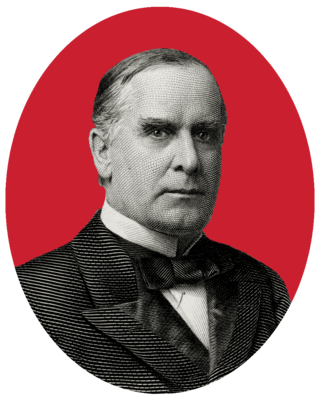
The 1900 Republican National Convention was held June 19 to June 21 in the Exposition Auditorium, Philadelphia, Pennsylvania. The Exposition Auditorium was located south of the University of Pennsylvania, and the later Convention Hall was constructed along the building's east wall. It was demolished in 2006.

The Taft Commission, also known as the Second Philippine Commission, was established by United States President William McKinley on March 16, 1900, following the recommendations of the First Philippine Commission, using presidential war powers while the U.S. was engaged in the Philippine–American War.
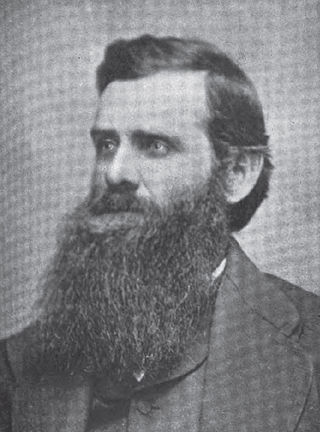
George Morgan Thomas was a U.S. Representative from Lewis County, Kentucky.
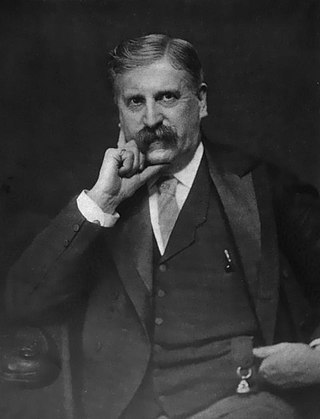
Charles Rufus Skinner was a U.S. Representative from New York.

The presidency of William McKinley began on March 4, 1897, when William McKinley was inaugurated and ended September 14, 1901, upon his assassination. A longtime Republican, McKinley is best known for conducting the successful Spanish–American War (1898), freeing Cuba from Spain; taking ownership of the Republic of Hawaii; and purchasing the Philippines, Guam and Puerto Rico. It includes the 1897 Dingley Tariff which raised rates to protect manufacturers and factory workers from foreign competition, and the Gold Standard Act of 1900 that rejected free silver inflationary proposals. Rapid economic growth and a decline in labor conflict marked the presidency and he was easily reelected.
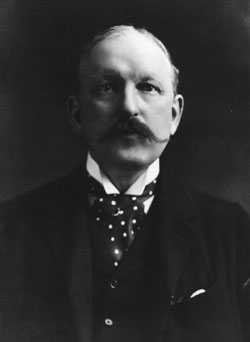
William Woodville Rockhill was a United States diplomat, best known as the author of the U.S.'s Open Door Policy for China, the first American to learn to speak Tibetan, and one of the West's leading experts on the modern political history of China.
Brutus Junius Clay II was an American businessman, political figure and diplomat.

Thomas E. Stone was an American civil servant who served as Chief Usher of the White House in Washington, D.C., from 1901 and 1909. Beginning in 1912, Stone worked as an Internal Revenue agent for the United States Department of the Treasury, where he won national acclaim for breaking major crime rings and capturing individuals who had fled from justice. He helped set up enforcement of Prohibition in several states in 1920, and helped break the largest illegal alcohol production ring in the United States in 1925. He served in a wide variety of positions with the Bureau of Prohibition, including chief of the 7th District from 1929 until his retirement in 1934.
The presidency of William McKinley began on March 4, 1897, when William McKinley was inaugurated the 25th president of the United States, and it ended with McKinley's death on September 14, 1901.
Rounsevelle Wildman was an American journalist, a member of the United States Foreign Service, and the owner and editor-in-chief of the literary magazine Overland Monthly from 1894 to 1897.